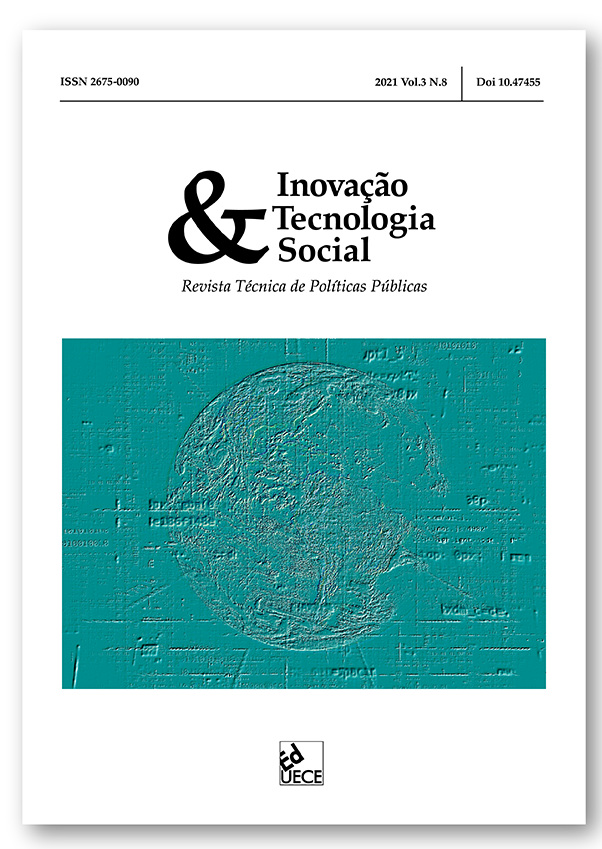Acessibilidade por contratos: o Tradutor e Intérprete de Libras educacional e os desafios da operacionalização das políticas públicas de educação de surdos no Amapá
DOI:
https://doi.org/10.47455/2675-0090.2021.3.8.10216Keywords:
translator and interpreter of educational pounds, public policies, inclusion, linguistic accessibility, deafnessAbstract
Accessibility for contracts: The Translator and Interpreter of Educational Libraries - TILSE and the challenges of the operationalization of the public policies of deaf education in Amapá sought to analyze the barriers imposed by the public administration regarding the guarantee of having interpreters of Libras in the classroom. The administrative contracts cited in the study are being used as a palliative measure to the resolution of the problem by the government that for presenting structural failures as the capture and data collection of the real deficiency in the schools by this professional end up walking watered down to legal processes and determinations emanated by the community that in turn see no other alternative if they do not turn to the Public Prosecutor's Office to guarantee the right. The study is contemporary and of great social relevance when external in its theoretical presuppositions, through Lopes and Fabris (2017), Alcântara (2013), Quadros (1997, 2008), Rech (2011), Milton Santos (2007), Santana (2007), Minayo (2009), Marilena Chauy (1994) among other legal sources, among them the publications of the National Education Policy if deaf from the Ministry of Education of (re) thinking public policies that reach the root of the problem, with a view to its resolution. The research presents the evolutionary path of the professionalization of the Educational Libras Interpreter in the state of Amapá, as well as the alignment of the national vocational training guidelines with a view to methodological quality in the use of the language headed by the Federation of Interpreters - FEBRAPILS (2017). We present a thin line elucidated in the study when the executive branch transfers the responsibility of developing the non-literate deaf student in Libras, present in the regular schools, to the professional of the Specialized Educational Assistance-AEE, without there being a guideline or much less preparation of this category, that in its contractual essence does not have such attribution. Field research was carried out with the Special Education Nucleus (NEES) and the Centro de Atención al Surdo-CAS, in addition to bibliographic research and documentary analysis, where through structured interviews with the managers of those sectors, to reach the objectives listed in the research, revealing the real scenario perpetuated in terms of attendance and inclusion of the deaf in basic education, and from then on, we can visualize possible ways to solve the challenges.
References
ARAUJO.A; NASCIMENTO.J.B.R;SILVA,S.F.K. Políticas e gestão dos espaços educativos: pedagogia III-.São Paulo: Pearson Prentice Hall, 2011.
AMAPÁ. Lei nº 0949, de 23 de dezembro de 2005. Dispõe sobre normas de funcionamento do Sistema Estadual de Educação. Diário Oficial do Estado, Macapá, 23 dez. 2005.
________. Lei n° 1.611, de 30 de dezembro de 2011. Altera a Lei nº 949, de 23 de dezembro de 2005, que dispõe sobre normas de funcionamento do Sistema Estadual de Educação. Diário Oficial do Estado, Macapá,30 dez. 2011.
_______. Lei n° 2.342, de 25 de maio de 2018. Altera a Lei n° 0949, de 23 de dezembro de 2005, que dispõe sobre normas de funcionamento do Sistema Estadual de Educação. Diário Oficial do Estado, Macapá, 25 maio 2018.
_______. Plano estadual de educação para o decênio 2015-2025. Macapá, 2015.
BRASIL. Constituição da República Federativa do Brasil. Brasília: Imprensa Oficial, 1988.
_______. Decreto Nº 5.296 de 02 de dezembro de 2004. Ministério da Educação. Secretaria de Educação Especial. Diário Oficial [da] República Federativa do Brasil, Brasília, 02 dez. 2004.
_______. Ministério da Educação e do Desporto. Conferência Nacional de Educação para Todos. Acordo Nacional. Plano Decenal de Educação para Todos. Brasília: MEC, 1993.
_______. Ministério da Educação. Secretaria de Educação Especial. Diretrizes Nacionais para a Educação Especial na Educação Básica. Brasília: MEC/SEESP, 2001.
_______. Ministério da Educação. Secretaria de Educação Especial. Adaptações curriculares em ação. Brasília: MEC/SEESP, 2002.
_______. Ministério da Educação. Secretaria de Educação Especial. Avaliação para identificação das necessidades educacionais especiais. Brasília: MEC/SESSP, 2002.
_______. Diretrizes Nacionais para a Educação Especial na Educação Básica. Brasília: MEC/SEESP, 2001.
_______. O tradutor e intérprete de língua brasileira de sinais e língua portuguesa: programa nacional de apoio à educação de surdos. Brasília: MEC/SEEESP, 2003.
_______.Declaração de Salamanca e linha de ação sobre necessidades educativas especiais. Brasília: UNESCO, 1994.
CHAUÍ, Marilena. Introdução à história da filosofia: dos pré-socráticos a Aristóteles. São Paulo: Brasiliense, 1994.
QUADROS, R.M. Língua de Herança: língua brasileira de sinais. Porto Alegre: Penso, 2017.
LACERDA, C. B. F. A inclusão escolar de alunos surdos: o que dizem professores e intérpretes sobre essa experiência. Caderno Cedes, Campinas, v. 26, n.69, p. 163-184, maio/ago., 2006.
LIBÂNEO, José C; OLIVEIRA, João F; TOSCH, Miza S. Educação Escolar: políticas, estrutura e organização. São Paulo: Cortez, 2007.
SAVIANI, Dermeval. Escola e democracia. São Paulo: Cortez, 1999.
SILVA, K. M. S. C. Intérprete de língua de sinais: um estudo sobre suas concepções de prática profissional junto a estudantes surdos. São Paulo:[s.n], 2013.
SKLIAR, C. A surdez: um olhar sobre as diferenças. Porto Alegre: Medição, 1998.



